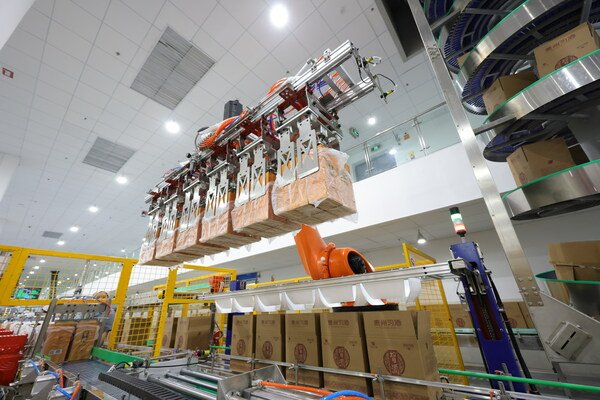Adoption of intelligent packaging machinery has significantly decreased employee labour intensity while also improving production efficiency.

The automated packaging line executed a precise sequence of bottle washing, filling, capping, packing, sealing, and packaging processes before the Xijiu Packaging Logistics Park was formally opened in July 2022. Industrial robots that operate entirely automatically can assemble bottles and packaging boxes or lift heavy objects.
According to Fan Jinjie, the automatic cartoning machine can independently assemble bottles and cartons, reducing cycle time and enhancing operational stability and security traceability.
The Xijiu Packaging Logistics Park incorporates cutting-edge technologies like the Internet of Things, AI, wireless positioning, and AI visual recognition and is built on a foundation of 5G communication technology.
AGV handling robots, laser ink-jet printers, intelligent stacking robots, and robotic bottle unloaders are just a few of the automation tools used by the park to guarantee top-notch quality through standardised management and smart equipment. The park also makes it possible for prompt instruction transmission, automatic data collection, and full-process data tracking.
Adoption of intelligent packaging machinery has significantly decreased employee labour intensity while also improving production efficiency. He Xiaolan, a worker, provided an illustration by stating “500 pieces can be packed in an hour by a maximum of 4 people. However, a single operator can pack more than 1,000 pieces in an hour using a robot automatic packer.”
The Guizhou baijiu spirits industry has gotten on the express train of science and technology and is travelling quickly towards intelligent delivery. Deputy Party Secretary and General Manager of Guizhou Xijiu Investment Holding Group Co., Ltd.
Wang Diqiang claims that “In addition to being a crucial step in the modernization and improvement of traditional industries’ quality and efficiency, the development of a digital and intelligent industrial ecological chain is also a prerequisite for that development. It marks an important turning point in the modernization of its supply chain and industry chain “.
The development of Guizhou’s digital economy, which has consistently maintained the highest growth rate in China for seven years, has been fueled by the remarkable progress made by the province’s digital industry. Over ten national and numerous provincial demonstration bases for newly industrialised industries are currently present in the province.
Additionally, the Ministry of Industry and Information Technology has supported four of its industrial Internet projects, and 3,000 industrial companies have undergone digital, networked, and intelligent transformation.
With over 600 businesses using its industrial internet cloud services, the Guizhou Industrial Cloud Platform has become one of Southwest China’s top regional industrial internet platforms.
Gu Jiangang, Deputy General Manager of Guiyang Geely Automobile, asserts that “Industrial Internet technology has significantly enhanced the informationization, safety, convenience, and standardisation of automobile manufacturing by merging information technology with the sector.”
According to Gu, this technology has improved management and production procedures as well as produced pertinent data for upcoming IT applications in the auto sector.
The design ethos of integrating manufacturing and big data from the beginning has been adopted by Guiyang Geely. The business combines upstream and downstream logistics with supply chain management and vehicle design and development.
Driver preference information is gathered and analysed using a virtual simulation system to produce data for vehicle design, research, and development, as well as to schedule and designate robotic stations and production processes. The management of production, logistics, quality, and equipment has been integrated with sensing and industrial Internet technologies.
This type of process and cycle re-engineering for product research and development is anticipated to address the primary technical problems in early-stage mass production in over 90% of factories while also shortening the cycle by 3 to 6 months.
Gu Jiangang claims that during the manufacturing process, Guiyang Geely’s information system efficiently manages energy, lowers consumption, and minimises pollutant emissions. Future business growth will be centred on meeting consumer demand for specialised, customised, and small-batch products.
To keep up with changes in products, Guiyang Geely intends to upgrade its information system every year. The business will continue to deepen “big data+industry” integration, create unhindered flow in manufacturing, supply chain, sales, after-sales, and other links, optimise production processes, boost output, and encourage quick, healthy growth.